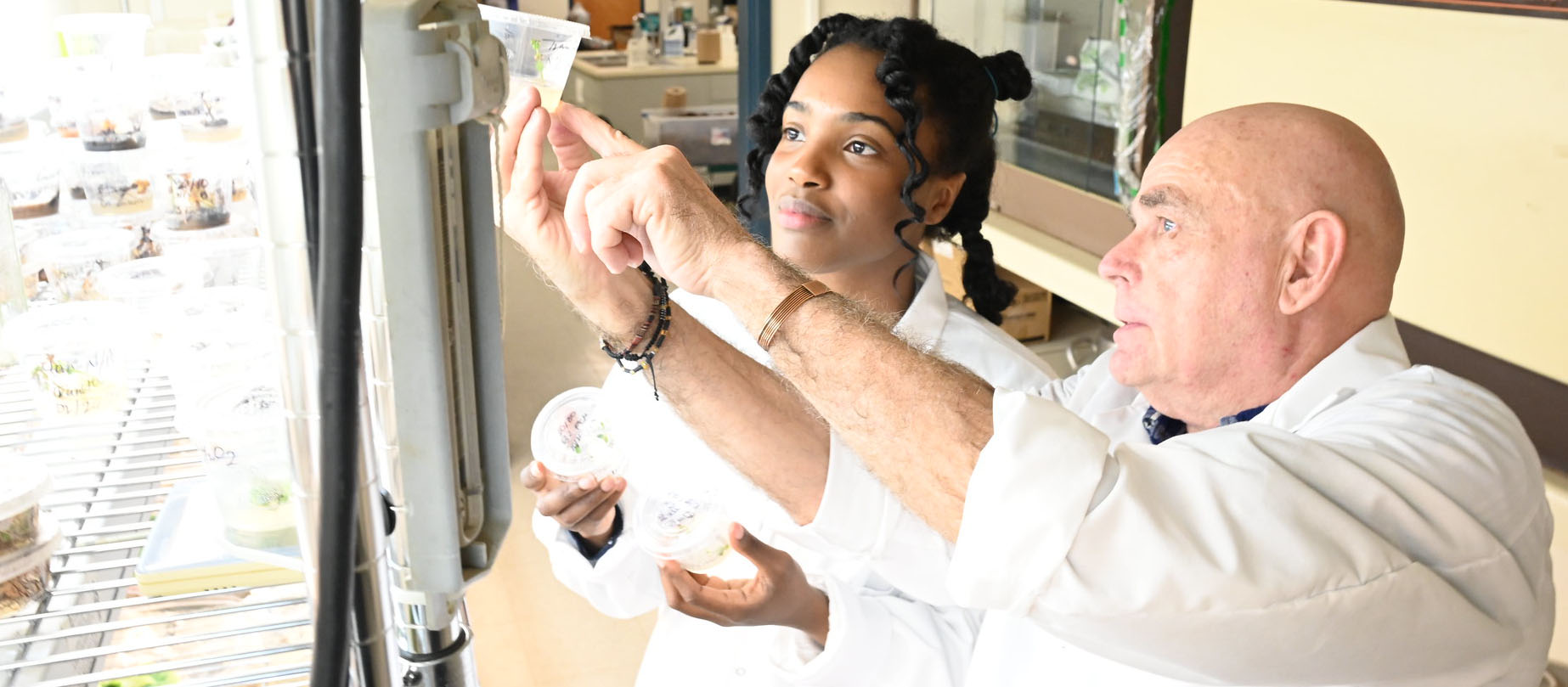Department of Plant Science
Coursework
The M.S. Program in Plant Science is a 30-unit program designed to provide advanced studies and in-depth knowledge in the fundamentals of Plant Science, as well as experimental design, technical writing, and formal presentation of research. Coursework provides a broad understanding of crop production and physiology, and thesis research allows for specialization. Areas of specialization may include: agronomy, pomology, horticulture, weed science, entomology, plant pathology, soils and irrigation, and mechanized agriculture. Graduate courses are offered in the late afternoon or evening permitting students to earn their degree within two or three years when working closely with an adviser.
Program Curriculum
All students must complete a 15-unit common core consisting of four 3-unit courses and three 1-unit topical seminars. Students must also complete 9 additional units of elective courses and 6 units of thesis research (PLANT 299) in consultation with a thesis committee. A thesis proposal must be prepared and successfully defended, followed by completion of the thesis research and presentation of that research in an exit seminar.
Core (15 units)
AGRI 200 (Biometrics)
AGRI 201 (Lab Techniques)
AGRI 220 (Research Communications)
PLANT 257 (Plant Physiology)
PLANT 270 (three, 1-unit topic seminars)
Electives (9 units)-- three courses from the list below.
PLANT 251 (Soil-Plant-Water Relationships)
PLANT 261 (Advanced Plant Health Management)
PLANT 252 (Plant Nutrition)
PLANT 255 (Crop Breeding and Improvement)
PLANT 250T (Special Topics in Plant Science)
Thesis Research (6 units) PLANT 299 (3 units in each of two semesters)
Total minimum requirements (30 units)*
*Under certain circumstances students may need to take additional units at the discretion
of the thesis adviser.
Course Descriptions
Agriculture (AGRI). These courses are taken by graduate students from several departments in the Jordan College of Agricultural Sciences & Technology.
AGRI 200. Biometrics in Agriculture (3)
Prerequisites: PLANT 99, AGEC 71, or MATH 101, or permission of instructor. Advanced
concepts in the design of agricultural experiments. Emphasis is placed on the selection
of appropriate designs to meet the objectives of well-planned experiments. Relative
merits of various designs and topics in analysis, interpretation, and regression are
covered. AGRI 200 - F
AGRI 201. Agricultural Laboratory Techniques (3)
Prerequisite: One of the following courses: BIOL 161; CHEM 105, 109; ENOL 115 or FSC
115. Agricultural problem-solving through the application of advances in laboratory
technology, crop management, foods, nutrition, soil and water quality. Theory and
practice operation of scientific instruments and techniques are taught. Student defined
project and report required. (2 lecture, 3 lab hours) AGRI 201 - S
AGRI 220. Research Methodology and Communications (3)
Critical literature review, quantitative and qualitative research design, scientific
writing, questionnaire design and use, and presentation of research results. Ethical
research issues examined. Approved for RP grading. AGRI 220 - F
Plant Science (PLANT). These courses are taken mostly by Plant Science graduate students
PLANT 252. Plant Nutrition (3)
Prerequisite: BIOL 161 and SW 100, or permission of instructor. Soil factors influencing
nutrient availability, mineral requirements of plants, and the acquisition and translocation
of nutrients and their role in plant metabolism. Soil and tissue analysis for fertility
management. (2 lecture, 3 lab hours) PLANT 252 - S Even
PLANT 251. Soil-Plant-Water Relationships (3)
Prerequisite: SW 100. Water flow and solute transport through the soil-plant-atmosphere
continuum (SPAC). Soil, plant, and water relationships affecting water use efficiency,
agricultural productivity, and environmental quality. Management of salinity, drainage,
and trace elements. Irrigation scheduling and water quality (2 lecture, 3 lab hours)
PLANT 251 - S Odd
PLANT 255. Advanced Plant Breeding (3)
Prerequisites: PLANT 150 or equivalent. Principles and techniques of plant improvement,
breeding methods, combining ability, sterility systems, quantitative genetic analysis,
heritability estimates, experimental designs for plant breeding. PLANT 255 - F Even
PLANT 257. Physiology of Cultivated Plants (3)
Prerequisite: BIOL 161 or permission of instructor. Plant cell structure and function.
Response of cultivated plants to the environment. Physiology and hormonal control
of flower induction, fruit set, and development. Review of pertinent current publications.
PLANT 257 - S
PLANT 261. Advanced Plant Health Management (3)
Prerequisite: PLTH 108 or permission of instructor. Comprehensive study of arthropod,
disease, and weed problems in California cropping systems. Examination of complex
relationships among crop plants and other biological organisms in agro-ecosystems
design crop management programs that are economically viable and ecologically sound.
PLANT 261 - F Odd
PLANT 270. Seminar in Plant Science (1; total of 3)
(Three units required.) Reviews of published and/or original research in the broad
areas of crop science, soil and water relations, and plant health. PLANT 270 - F, S
PLANT 290. Independent Study (1-3)
See Academic Placement -- Independent Study. Approved for RP grading. PLANT 290 - F, S
PLANT 250T. Topics in Plant Science (3)
Prerequisites: upper-division plant science course appropriate to study topic or permission
of instructor. Advanced studies in a selected area of plant science which could include
new or emerging issues and technologies. Topics may require lab hours. PLANT 250T - Periodic
PLANT 299. Thesis (3; total of 6)
Prerequisite: prior advancement to candidacy. See Criteria for Thesis and Project. Thesis research work and preparation. Submission of an acceptable written thesis
for the master's degree. Oral presentation of thesis research required. Must take
3 units in each of two semesters. Approved for RP grading. PLANT 299 - F, S
